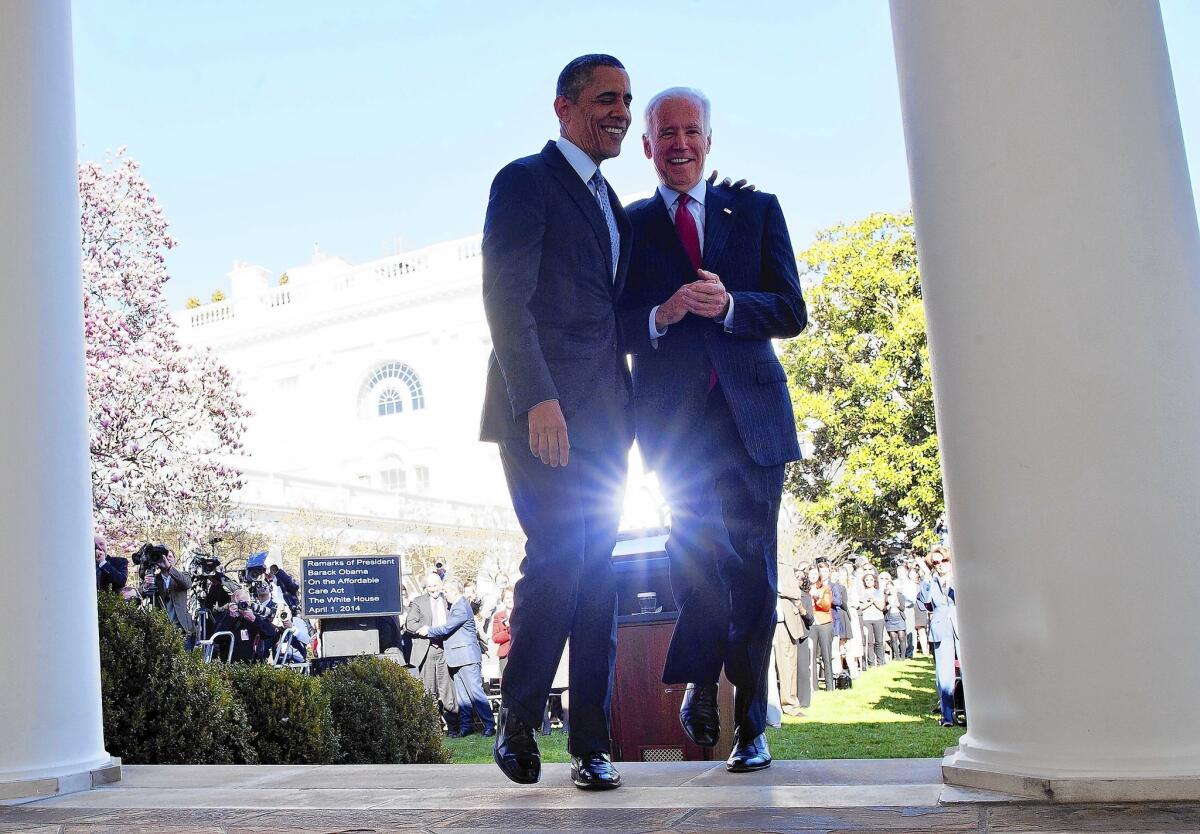Obamacare passes first big test

WASHINGTON — The Affordable Care Act has passed its first big test, but the law’s distribution of winners and losers all but guarantees the achievement will not quiet its political opposition.
White House officials, who had a near-death experience with the law’s rollout six months ago, were nearly giddy Tuesday as they celebrated an open-enrollment season that ended on a high note.
Despite the early problems with the federal website, “7.1 million Americans have now signed up,” President Obama declared in a Rose Garden speech to members of Congress, his staff and supporters in which he notably returned to referring to the law as “Obamacare.”
Democrats in Congress said that when people who started the process complete their enrollments later this month, the total could reach 8 million. Already, the enrollment has hit the mark predicted by the Congressional Budget Office when the law passed in 2010. At the most basic level, that means it is mostly working as advertised.
“This law is doing what it’s supposed to do,” Obama said, “all of which makes the lengths to which critics have gone to scare people or undermine the law or try to repeal the law without offering any plausible alternative so hard to understand. I’ve got to admit, I don’t get it.”
A major source of the intense opposition, however, is basic self-interest: The law’s costs and benefits are not evenly distributed between the parties. Those who stand to gain belong heavily to voter groups that favor Democrats. Americans who form the heart of the GOP coalition are less likely to benefit, but bear a significant share of the law’s costs.
That reality makes it unlikely that Republican elected officials will mute their opposition to Obamacare, and Tuesday they showed no sign of doing so.
“House Republicans will continue to work to repeal this law and protect families and small businesses from its harmful consequences,” House Speaker John A. Boehner (R-Ohio) said.
Under Obamacare, millions of Americans gaining coverage for the first time will get added financial security and improved access to care. Surveys by Rand Corp. and Gallup, as well as information from insurers, strongly indicate that the law has reduced the number of Americans who lack insurance by at least 9.5 million.
The beneficiaries are mostly low-income working families that qualify for subsidies designed to make insurance more affordable, and people farther down the income ladder who benefit from the law’s expansion of Medicaid.
A smaller, but significant, number of people will pay higher insurance premiums than they used to and, in some cases, higher taxes. Those people are disproportionately Republicans.
The more than 40 million Americans who lack insurance include both Democrats and Republicans, of course, but not in equal numbers. In March, for example, Gallup found that about 30% of uninsured Americans either identified themselves as Republicans or leaned to the GOP, but 40% identified or leaned to the Democrats.
That gap reflects big differences by age, income and race in who supports the two parties.
Americans 65 and older, for example, are the only age group in which Republican supporters outnumber Democrats, according to an analysis by Gallup of 18,000 polling interviews. Senior citizens get their health coverage from Medicare, making Obamacare unnecessary for them.
The law does include one significant benefit for retirees — a provision that reduces the out-of-pocket costs for prescription drugs for some Medicare recipients. But despite the administration’s efforts to tout that benefit, it has not been enough to change the negative view that seniors have.
Republicans also outnumber Democrats among upper-income Americans, who earn too much to qualify for the law’s subsidies but who may earn enough to be hit by its new taxes.
And affluent small-business owners, among the most loyal Republican voters, are heavily represented among the people who bought insurance on the private market before Obamacare. Insurance companies were able to offer relatively inexpensive policies on that market to people who were healthy because they could deny coverage to millions of others who had health risks. Now that companies can no longer do so, some people who previously benefited face significantly higher premiums.
“All across the country our constituents are having an unpleasant interaction with Obamacare. Whether they can sign up for a policy or not, they are discovering, of course, higher premiums, a higher deductible,” Senate Minority Leader Mitch McConnell (R-Ky.) said Tuesday.
Some statements that Republican officials have made about the law’s impact don’t stand up to scrutiny. But that one accurately described the experience of a significant number of GOP voters.
Self-interest does not account for all the opposition to Obamacare. For many conservatives, the law also has come to symbolize the expansion of government that they oppose. But the way the law’s costs and benefits are distributed intensifies the conservative distaste.
Obama’s political advisors know that and recognize they are unlikely to convert those who oppose the law. Over the next several months, they hope to get those who already like the law to feel more strongly about it.
Currently, opponents of the law feel more intensely about their position than do supporters. If Obama can succeed in changing that, he could gain politically from his argument that Republicans are standing against a reform that has made life better for Americans, his advisors hope.
For a day, Democrats managed to put aside their anxiety about the law’s political impact and celebrate.
“Republicans’ entire political strategy for the spring and summer and the fall is disintegrating before our eyes,” Sen. Christopher S. Murphy (D-Conn.) said at a news conference.
But White House Press Secretary Jay Carney more realistically acknowledged the difficulties ahead.
“I’m not suggesting that just because we crossed this threshold that everything is going to be perfect on this issue,” he said. “We’ve crossed one milestone here, but there are many more to cross in the future.”
Times staff writer Michael A. Memoli contributed to this report.








